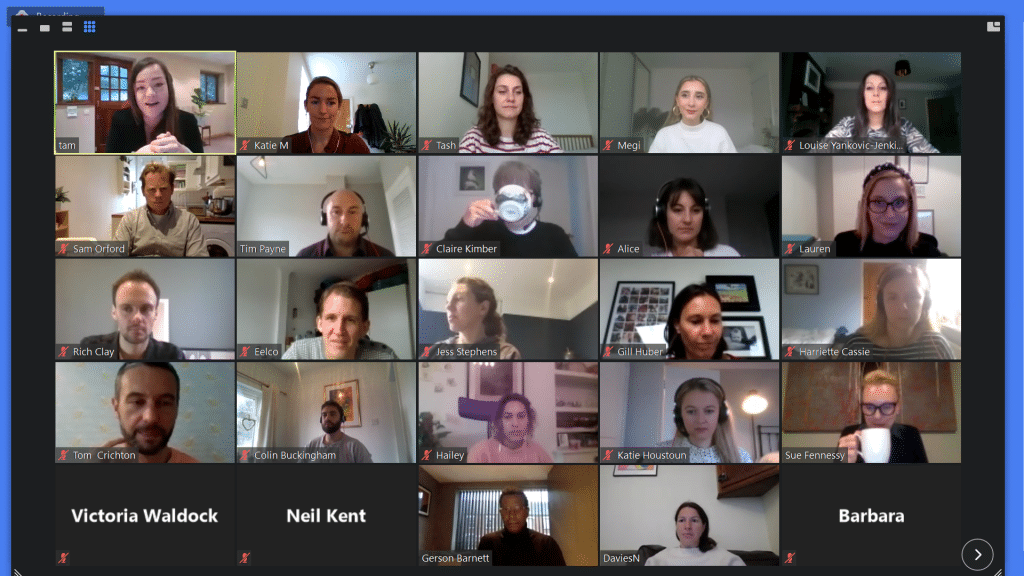On 1st October Zenith hosted its first Media Sustainability Workshop via Zoom, with over 20 clients attending from a range of verticals including KAO, Nomad, Aviva, NatWest, and EBS for a day of inspiration, education, and interactive workshops. The aim was for each group to identify strategies and opportunities around how marcomms can be used as a force for good, driving sustainability goals within their businesses, and ultimately increasing ROI and profitability. This feeds into Zenith’s goal of becoming a more sustainable agency, helping our clients in an area of sustainability that we can have influence – their media.
2020 was not the year we were anticipating, and whilst the COVID19 pandemic has disrupted our routines, and taken over as the #1 fear of people in the UK, sustainability and climate change has remained in the top 3 – with 1 in 10 people saying it is their biggest fear, according to Foresight Factory. Now more than ever people are looking at companies and brands with scrutiny in the area of ethics and sustainability, seeking honesty, transparency, and ultimately action on the back of their statements. As marketing and communications are often the public’s window to a company’s values, this time of change and ‘Building Back Better’ can be used as a spring board to show consumers what brands stand for, which we discussed tactics for achieving in both the long and short term.
Client Spotlight: Nestle
The day opened with an inspiring talk from Steve Pollock, Head of Media Communications at Nestle. The idea for a Sustainability Workshop was born from our work with Nestle, for whom this is a big focus area. Steve spoke about his “lightbulb moment” realising that media could play a part in impacting sustainability – something he said has had the same “aha!” effect on everyone he mentions it to (note: this was also happening in the workshop as he spoke). Since Nestle’s workshop, Steve and his team presented their key pillars back to the business, and found it to be “like pushing on an open door – everyone wants to be involved.“ It’s now being fed through their entire business, with sustainability training being developed for all employees, and sustainability written into their KPIs. In their media, Nestle have already begun working with media owners that are driving change and giving back – Steve also assured the other clients that prioritising opportunities was the best way to get started; don’t try to do everything at once, but it’s in the marketing industry’s own interest to move in this direction where possible, along with the partners and agencies involved.
Inspiration and Ideas from a Sustainable Marketing Perspective: Kathleen Enright, Salterbaxter
Up next was our keynote speaker, Kathleen Enright, Managing Director of Salterbaxter, a specialist consultancy where sustainability and strategic expertise are combined with creative thinking and communications, and also part of the Groupe. Kathleen started with an explanation on how she finds using the challenge of using marketing as a way to drive sustainability to be one of the most fascinating, intellectual and creatively challenging areas to work in. At Salterbaxter their approach is to make this area creative, tangible, and actionable. Kathleen discussed Kate Raworth’s Donut Economy Model – how we can balance small steps with radical thinking and big innovations amongst social issues, environmental issues, and planetary boundaries, and where media sits within this. An example she showed of the carbon emissions across a range of media channels, from inception to end of life, highlighted the hidden environmental impacts of some channels. Namely, Google Search campaigns, which due to their data centres and back end workings emit an amount of carbon that puts them on par with the airline industry, a figure that is projected to increase significantly in the coming years – a pointed example of the lack of awareness on the impact of their media campaigns.
She also discussed how brands can use their power for good; whether that be editorial content aligned with, or visuals being used, aka Subliminal Cues; marketers have an opportunity to change public behaviour through their content. An example is Nivea only use shower visuals over bath scenes as it’s more water-efficient, or Cathedral Cheddar only show people putting packaging in the recycling, and kitchen taps turned off – normalising sustainable living.
Kathleen finished by discussing industry self-regulation on an international scale, a key theme that came through in the media owner presentations, and something clients all expressed wanting more action on in the media realm. As an agency, Zenith are already looking at how we can align with our own industry initiatives, and we are already in discussion with the IPA on an exciting update which will debut in 2021.
In the next section, we handed over to our clients who provided a brief overview on what they’re doing in sustainability within their organisations and teams, and their goals for the future. It was great stimulus for the workshops to hear from other marketing teams on their progress and initiatives, recognising that everyone was on the same journey and facing similar challenges.

Developments and Initiatives in Media: Google, C4, ITV, Sky, The Guardian, Posterscope, givewith, WeAre8, Good-Loop
Moving to the next section were presentations from Google, Channel 4, ITV, Sky, The Guardian, Posterscope, givewith, WeAre8, and Good-Loop. While their platforms range in size, channels, and audience, there were strong industry themes that showed through:
- Green production of content: The three broadcasters all discussed their use of the albert Calculator – which measures the footprint of TV productions. Posterscope spoke about how OOH sites are being built as carbon neutral, and the exploration of new technologies that are going to transform the infrastructure of the outdoor industry.
- Content as a force for good: Whether it be television shows or the editorial content on the Guardian, there was a recognition that it’s their job to help change behaviours through the types of stories being told, as well as educating and informing their audience on the truths around climate change and what they can do about it.
- Ad attention paid forward: Good-Loop, givewith, and WeAre8 are three “challenger” media owners that have interpreted this theme in a slightly different way. Using their advertising platforms, brands can direct some of their media spend towards positive social initiatives via charities and donations. This in turn results not only in positive sentiments and uplifts in brand metrics, but also in strong media results, especially in attention and engagement metrics.
Workshops and Media Sustainability Roadmaps
Following the presentations, we broke into workshop groups for each client, which focussed on discussion and guided action planning on how they can take what they’d learnt and align it with their own brand objectives, positioning, and goals. The output of these was a bespoke Media Sustainability Roadmap for each client; identifying key themes, then distilling these down into the main priorities, with objectives and KPIs put against them and Next Steps on follow ups from both Zenith and the client teams. These were presented back to the wider group, and despite the range of organisations they belong to, consistent themes came across, including:
- Changing briefs to Zenith to include sustainability goals
- Utilising a carbon calculator for media plans
- Applying an optional “carbon offsetting tax” as a line item on media plans like ASBOF
- Putting a set % of media spend toward “sustainable” media owners – eg the likes of Good-Loop, WeAre8 and givewith
- Rallying the industry to push media owners to provide discounts to brands which are more sustainable
- Rethinking advertising creative through things like ensuring the right subliminal messaging in creative
- Ensuring production is carbon neutral with partners like albert
Since the workshop clients have expressed how useful and constructive they found the day, especially the opportunity to hear what’s happening across the wider industry and in different verticals:
“Thank you so much for today. It has been so instructive, so inspiring. It’s been a revelation finding out about the sustainability, or otherwise, of our media choices. This is something that will lead to a great result for us but also potentially a message we can start to speak about externally as well.” – Anne Phillips, Marketing Manager, The Famous Grouse at EBS
“Zenith’s workshop brought together brands and media owners to present and share their work and plans on sustainability. It was an educating and inspiring session generating ideas, momentum and a sense of optimism. From this session we made new contacts and found new opportunities. Individually and collectively we can do more across the industry to act and measure sustainable marketing and promote better practices through workshops like this.” – Peter Rowe, Brand Planning Lead at NatWest Group
“On behalf of the team I want to send a massive thank you for organising today’s workshop. I know how much work goes into these sessions and I was blown away by how well it was structured, the number of participants from such a variety of industries and the amount of useful insight that was shared.
I feel we have gained lots of new thinking that we can share with the wider team and impact positive change, the template we completed together was a great structure and has brought energy to many things we can start to move forward.” – Louise Yankovic-Jenkins, UK Marketing Manager at KAO
As their agency partner we absolutely loved seeing the thought and enthusiasm everyone put into their roadmaps, and our teams have already begun investigating how they can implement some of the actions identified. We hope this session was the first of many client sustainability initiatives as we increase our focus on this area as an agency and work with the industry to have a positive impact on the planet.





Comments are closed.